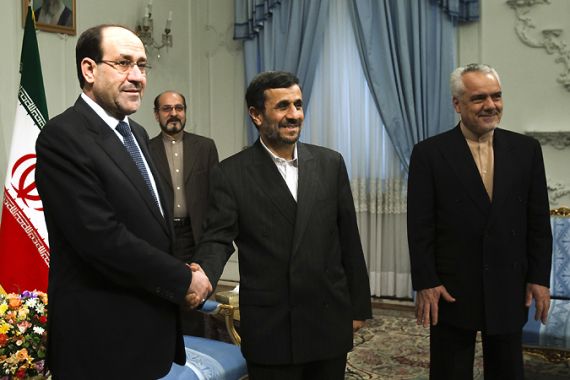Iraqi PM courts Iran during visit
Politically controversial trip comes amid reports in media of direct Iranian help to keep al-Maliki in power.

 |
| Tehran is reportedly backing efforts by al-Maliki to form a government [Reuters] |
In a move unlikely to allay fears about Iran’s rising political influence, Nouri al-Maliki, the Iraqi prime minister, has held talks with Mahmoud Ahmadinejad, the Iranian president, and other officials in Tehran.
The trip to the Iranian capital on Monday comes amid reports that Iran has been directly involved in convincing Muqtada al-Sadr, the leader of a pro-Iranian Shia Muslim bloc, to back an al-Maliki-led government.
The move, reported by LA Times and the UK daily Guardian, would increase Iran’s influence in Iraq against that of Western powers.
The move would also sideline Iyad Allawi, a former Iraqi prime minister. His secular bloc won the most seats in March elections, but it has been unable to form a government, leaving a political deadlock.
After arriving in Tehran for a day’s visit as part of a regional tour, al-Maliki urged Tehran to help rebuild his country. He described Iraqi-Iranian relations as “strategic”. His next stop is the holy city of Qom.
“We ask Iran and our neighbours to support our reconstruction and to boost economic and commercial co-operation, which will help improve stability in our region,” al-Maliki said, according to a statement issued by his office in Baghdad.
Amadinejad told the Iraqi prime minister that Tehran “fully supports a united, strong and independent Iraq which serves its own people and works for regional progress and Islamic values,” Iranian television reported.
Al-Maliki also held talks with Ayatollah Ali Khamenei, the Iranian supreme leader.
“The Iraqi nation is vigilant and aggressors cannot dominate this country again. May God get rid of America in Iraq so that its people’s problems are solved,” Khamenei told al-Maliki, according to a statement by Khamenei’s office.
Allawi criticism
Allawi, in an interview to CNN on Sunday, accused Iran of “trying to wreak havoc on the region”.
|
“The US is in the game, Iran is in the game, and it should be normal for anyone to think that Iraq has got to reach out to Iran.” Steve Clemons, New America Foundations |
He said Iran was “trying to destabilise the region by destabilising Iraq, and destabilising Lebanon and destabilising the Palestinian issue”.
Allawi said “this is where unfortunately Iraq and the rest of the greater Mideast is falling victim to these terrorists who are definitely Iran-financed and supported by various governments in the region”.
His deputy, meanwhile, has been quoted as saying that the reported Iranian involvement amounts to a takeover of Iraq.
US worries
US State Department spokesman P.J. Crowley said Washington was also worried about what he called Iranian «meddling» in the formation of a new Iraqi government.
“We are concerned about any neighbouring country that would meddle in Iraq’s affairs,” Crowley said.
“Ultimately, this has to be an Iraqi decision as part of its own political process. … We would expect the Iraqi government to work on behalf of its own citizens rather than on behalf of another country.”
The controversy centres on how al-Sadr’s support came about, Al Jazeera’s Nicole Johnston reported.
“A secret deal was done between a number of regional, senior Shia figures and Tehran. Their aim, apparently, was to install a pro-Iranian government,” she said.
Yet, some analysts argue the accusations against Iran are overblown.
“I would say that the United States is pulling its fair share of strings too,” Steve Clemons, director of the America Strategy Program at the New America Foundation, told Al Jazeera.
“The US is in the game, Iran is in the game, and it should be normal for anyone to think that Iraq has got to reach out to Iran.”
Speaking to Al Jazeera from Baghdad on Monday, Jane Arraf, a journalist, said: “It is hugely important that the Sadrists have backed Maliki but as with everything in Iraq, it is not over until it is over.
“Even with the Sadrists, Maliki does not have enough seats to gain a majority in parliament.
“This is a fascinating but intractable problem because Maliki needs broad support to have a government that lasts.
“So that would mean support of the Sunnis, who have mostly backed Allawi.”
Prospect of violence
Arraf said that there is a fear in Iraq that if they are again are left out of government, the Sunnis could feel alienated, raising the prospect of increased violence.
Al-Maliki visited Syria last week for the first time in more than a year, after a rift in which he blamed Syria for a series of deadly car bombings in Baghdad in 2009.
Al-Maliki and Allawi have been locked in a protracted battle for the post of prime minister.
Al-Maliki’s Shia-led State of Law bloc finished a narrow second behind Allawi’s mainly Sunni-backed Iraqiya alliance but neither came close to securing a parliamentary majority in the March 7 general election.
Allawi’s Iraqiya bloc has 91 of 325 seats in parliament, while al-Maliki’s grouping holds 89 seats.
Many say the political deadlock is feeding violence.
On Monday there were several outbreaks of violence, including a bomb blast that killed a member of Baghdad’s provincal council. Jassim al-Sa’edi was travelling through Nahda district in central Baghdad when the blast went off. There were also attacks in the district of Karrada, and in Mosul.